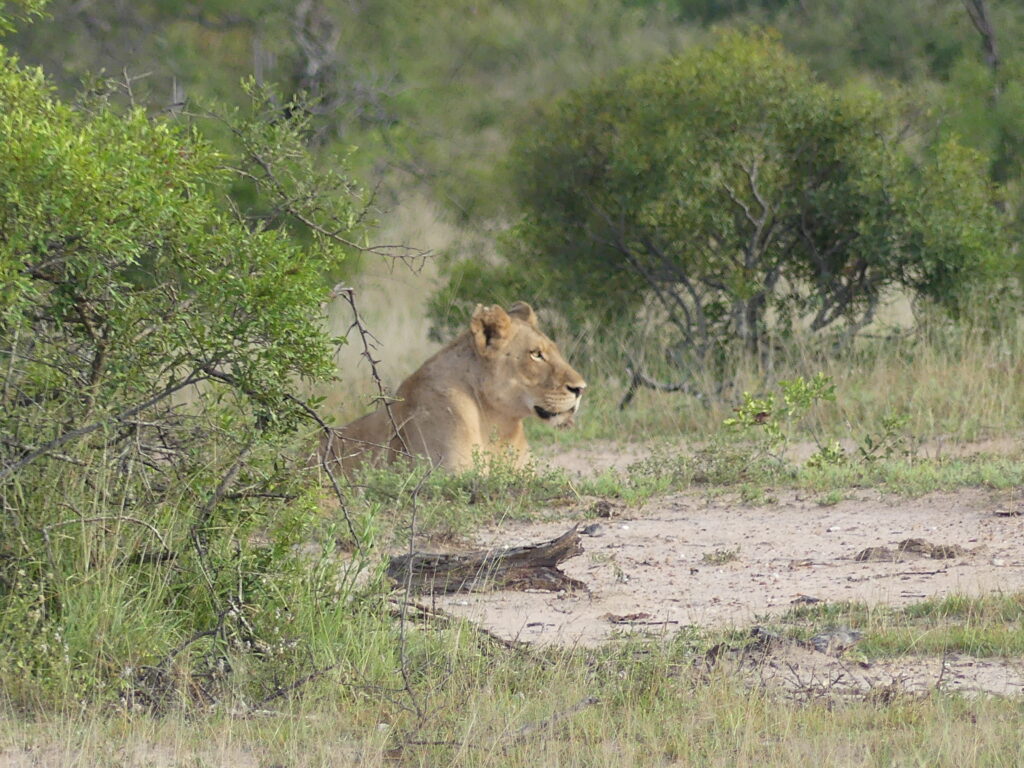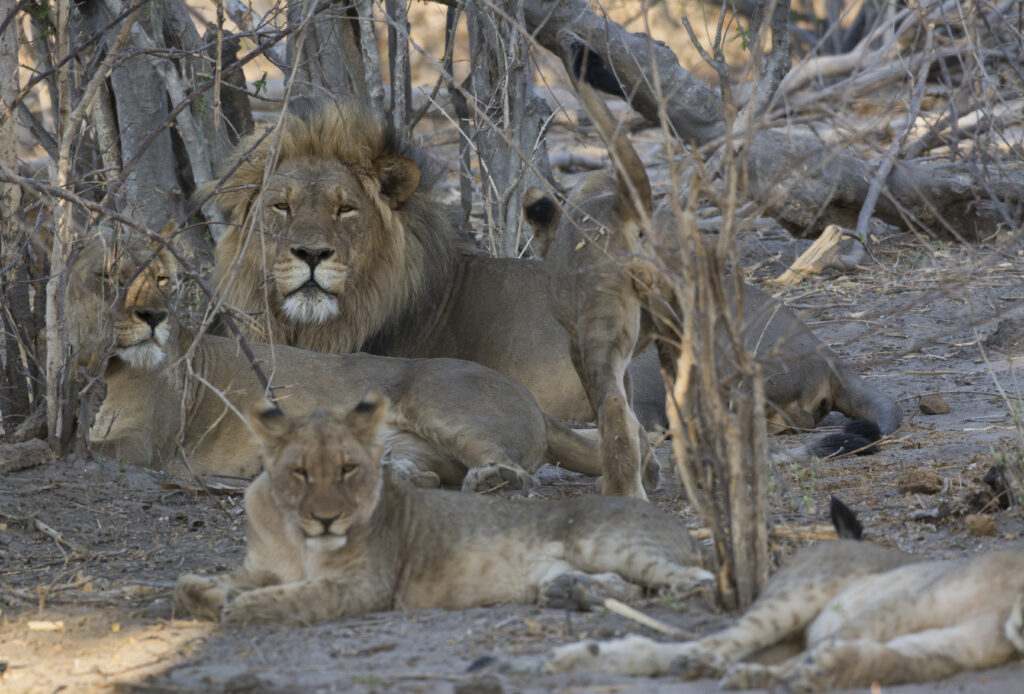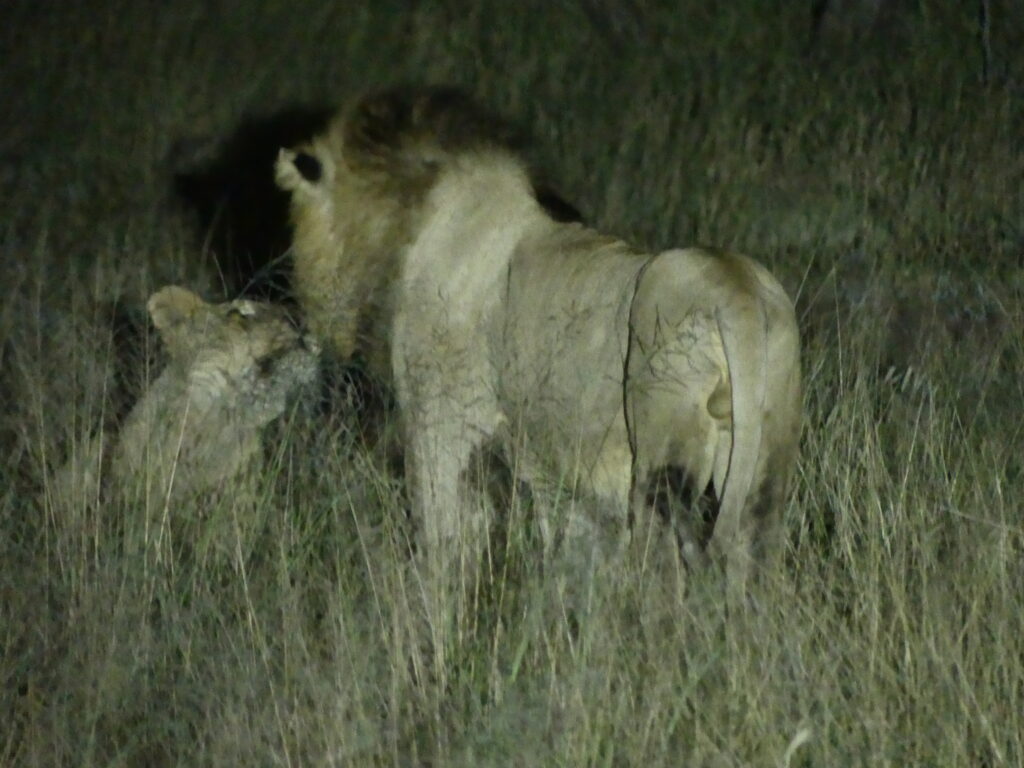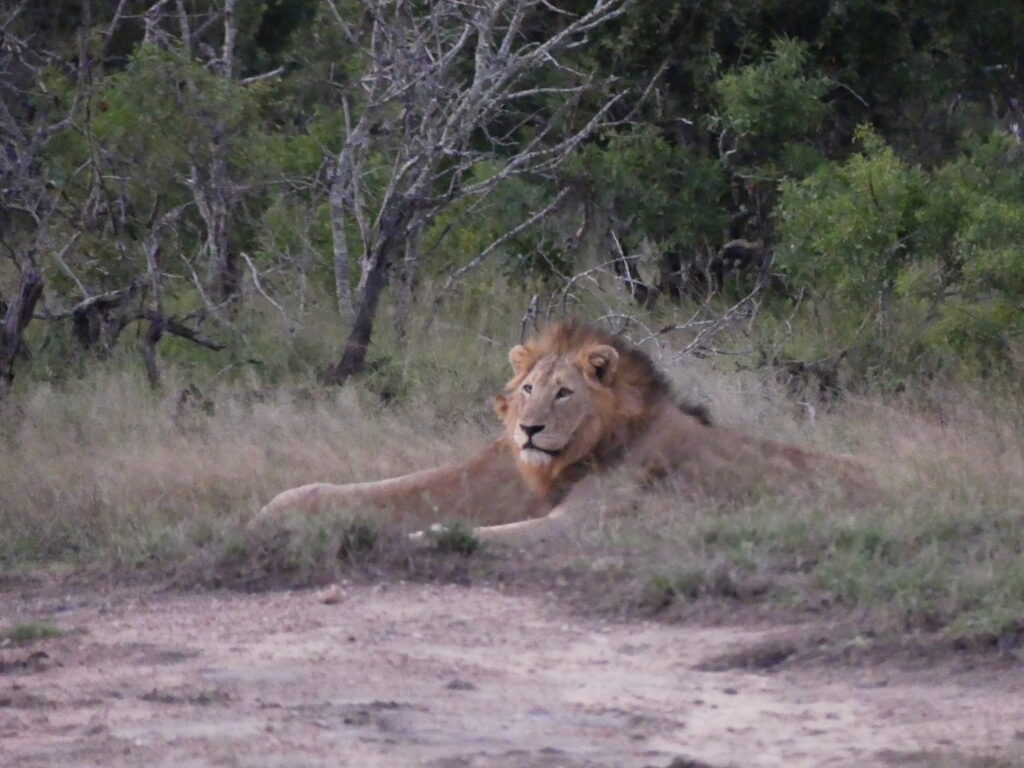The general behavior of lions
African Lions (Panthera leo) are sometimes overrated in their danger for people hiking in Big-5 game areas. Lion behavior is such that they normally sleep and rest for 20 hours a day just to replenish their strength after a strenuous hunt. But if something interesting occurs for them during resting, they can be up and going within seconds. Therefore, lions are partially predictable and partially not.

During nighttime, their calls can be heard up to a distance of about 7 km apart. That’s possible because lions have specially adapted vocal folds, which allow roars of up to 114 dbA. A lion’s roar during nighttime can be distinguished if it is either from a male or female lion. Distinguished by the number of short grunts after the long calls. If there are more than 12 short grunts, it’s a male calling. I already counted up to 28 short grunts from a male lion.
Where to find lions in the morning

The direction from where the calls were coming can be roughly determined. The intensity of the sound will give a clear indication of how far away the lion is. By knowing the lay of the land and if male or female plus the direction and distance of calls, their behavior and place to find them can be judged. Another important information is the type of vegetation to expect in the area, where the calls were coming from. Lions want to have an overview of the area they are lying up. And they avoid as much as possible to drudge through wet grass.
In Bushveld and scrubland areas of African savannas, the grass will often be wet in the morning. And it will dry up quickly when it is getting warm. After hunting during night time, lions will lay up and don’t move around in the morning anymore. In case they were feeding in an area, which they don’t like for resting, they will move around at either sodic sites or sites with low or no vegetation, like road tracks.
Unpredictable behavior

That’s the predictable part of lions. They can either be found near the place they were calling from an area with a good overview, or their tracks can be found at road tracks nearby or in vegetation-free zones.
The unpredictable part of lions comes into the equation if no calls are heard and it is completely unknown where they are. Because after feeding at night, lions lie down in an area with a good overview – and this can be anywhere. Next to an inconspicuous bush in thick grass, in the middle of thick Bushveld, or any type of vegetation.
Lion behavior during daytime

Luckily, during the daytime, lions – normally – adhere to the four zones principle. Comfort zone, where they are not aware of people being there. Alert zone, having seen you, and will watch you. Warning zone, where they give you a clear warning that they are not happy with your approach anymore. And Critical zone, where they either flee or fight (Flight- or Fight zone).
If approaching into the warning zone, lions will give you a good growl – and you should heed it. In case they see that you received the warning, but do not care about it, they will growl again. When still approaching the critical zone, normally and during daytime, they will move off. But every animal has its unique character. There are heroes and cowards, and bold lions and cautious ones. Lucky you, if approaching a cautious one. It can also be different.
Personal experiences with lions on a trail

Once in a small trekking group during the daytime, we approached two lionesses and were still in the alert zone. Suddenly a male lion appeared and walked very determined into the warning zone – which was his kind of warning. And he did not stop at all but approached us fast. Because he wanted to chase us away from his lioness in oestrus. We moved very fast out of the area. The male lion followed us very determined for about 200 meters when he let us go.
Personal experience with lions, when in a car
I had another experience near Nxai Pan in Botswana, driving with a 4WD from the tracks into the bush. And we came very close to a pride of lions. Meaning, we moved fast and directly into the critical zone. And that time, the dominant male lion chose to fight. We were about 20 meters away from the pride. He runs at high speed and very low to the ground towards our Toyota Hilux. Then he jumped from behind onto the back of the car. And he was hanging on the car when I was speeding up. And finally, he ripped parts of the rubber sealing of the rear window out of place by its claws.
He also scratched one side of the car badly. That was a scary moment. And I learned a lot from that experience. Firstly, never surprise a lion in its critical zone. Secondly, male lions don’t give a jiffy of how big you are, they just defend their family and territory.
With these examples, I wanted to illustrate that lion behavior during daytime is often predictable but they still are dangerous. And there is one more factor, which has to be added. The more habituated lions are becoming, the more dangerous they are. They got used to certain traits of humans, which – when these traits deviate- seem to be threatening to the animals.
Lion behavior at nighttime

During nighttime, the same lions seem to be a different breed of animals. Lions have night vision, which is eight times better than that of humans. So, for them, night is not a scary circumstance, but they see well and their prey, herbivores, do not. Lion behavior is such that they are on the prowl for food during the night, and they check out every possible food source within their territory. Other humans describe them as ‘curious’ during nighttime. Partly it is curiosity, but partly also hunger. And again, they are not scared of anything. Least of these slow-moving animals (Homo sapiens) – which are normally not on their menu list. But if these homos are sleeping in a small One-man tent in the bush and maybe females are having their period, things are getting interesting for lions to check them out.
These are the occasions, where mainly human females are getting pulled out of their tents and sleeping bags by lions. Or refugees from Mozambique are getting pulled off trees in Kruger National Park one by one. I got a first-hand account of a sole survivor of such a tragedy.
Personal experiences with lions during nighttime

I, was never attacked at night. But always had a horrible feeling when getting out of the tent during nighttime and walked ten meters into the bush for a small relief. And twice I came around a lioness, which was walking around our tented camp at morning twilight. Just about ten meters apart from me. The big problem is, that such encounters breed a kind of carelessness into our behavior. ‘There was no attack, nothing happened, so also in future everything will be fine’. Wrong – things can turn around badly if not always be alert and show all animals the necessary respect.
Lessons learned about lion behavior
- If lions during daytime see you approaching, they will warn you at an appropriate distance
- In case lions will be surprised in their critical zone, there will be either fight or flight
- Lions during nighttime are highly curious and often driven by hunger
- Humans are not regarded as prey. And lions know from thousands of years’ experience that these animals on two legs can throw objects towards them, that will hurt. But exceptions are occurring regularly – even today.



